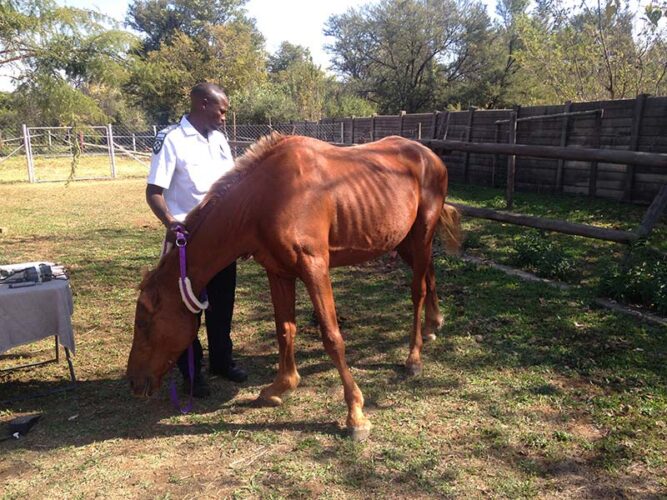South Africans are familiar with the work done by the Society for the Prevention of Cruelty to Animals (SPCA) in connection with pets. However, smallholders should also be aware of their services when it comes to the well-being of farm animals.
The NSPCA operates on a national basis with dedicated inspectors in specialised units which each cover specific animal welfare issues.
SPCAs in South Africa are governed by the SPCA Act 169 of 1993 which is administered by the NSPCA, constituting it as a statutory body.
The organisation not only speaks for those who cannot speak, namely the animals, but in 2016 the Constitutional Court ruled that the NSPCA has the statutory power to institute private prosecutions.
SPCAs are obliged to respond to any complaint that is made in connection with animal welfare, enforcing the Animals Protection Act No. 71 of 1962 when deliberate cruelty takes place.
There are a number of different units with specific foci and one of them is the Farm Animal Protection Unit (FAPU).
The use and abuse of farm animals, which now by legal definition includes crocodiles and certain species of wildlife, in sheer numbers of animals affected far exceeds any other form of mistreatment.
The FAPU is committed to improving the quality of life of these animals and ensuring their compassionate and humane handling.
Pro-active work includes inspections and the taking of appropriate action at facilities where animals are farmed, bred, housed, handled, transported or slaughtered.
Facilities include intensive and small scale farms, pounds, abattoirs, sale yards, hatcheries, prisons and agricultural facilities. They also inspect petting farms, crocodile farms, alpaca farms, mohair farms and animals being exported.
The SA Smallholder has for some months documented the NSPCA’s campaign to have the shipment of live animals banned. They have partially succeeded in encouraging the withdrawal by leading Kuwaiti livestock trader Al Mawashi from transporting live sheep to the Middle East. The NSPCA’s application to completely ban the live export of animals by sea from South Africa is still to be heard in court later this year.
The Farm Animal Protection Unit undertakes the monitoring and protection of sheep, pigs, goats, cattle including dairy cows, poultry, ostriches, emus, crocodiles, rabbits, equines, and alpacas; plus farmed fish and other aquatic species raised for food production.
Their reactive work includes responding to complaints, all of which are investigated and feedback given.
So if Smallholder readers see that animals in their area are not being adequately fed and looked after they may report this to their local SPCA.
This is how they suggest members of the public should go about reporting:
Firstly, if the cruelty is something that can be stopped immediately, then stop it. If, for example, a horse or a dog is being unmercifully beaten, intervene if you can safely do so.
Of course, the sort of person who would mistreat an animal this way would be quite likely to vent his anger on anyone who interferes, and members of the public should use discretion.
If the situation can be recorded, photographs or videos are useful evidence.
When you contact the SPCA, whether by phone of email, be ready to give as much of the following information as possible:
- Your own name, address and telephone number. This is necessary for record purposes and also enables the inspector to inform you of the result of his/her investigation. It is the policy of the SPCA to treat all complaints in strict confidence. Names of complainants are divulged to nobody unless such complainant has no objection.
- The name(s), address(es) and telephone number(s) of the person(s) involved.
- The date, time and place of the offence.
- The names, addresses and telephone numbers of any witnesses.
- The registration number and description of any vehicle involved.
- State whether you would be prepared to testify in a court of law.
Then give a detailed description of what you saw, as factually and unemotionally as you are able. This is important, for emotion clouds coherence, and important details may be omitted.
It might happen that people are concerned about the treatment of animals, but are not sure that the offences should be reported. Two South African National Standards (SANS) were published in 2014 which are guidelines for the humane treatment of livestock. These National Standards are read together with national legislation (Animals Protection Act and other relevant legislation) making them supplementary legislation.
- SANS 1469:2014 Humane handling and facilities for the protection of livestock at shows, auction sales, vending sites and livestock pounds;
- SANS 1488:2014 Humane transportation of livestock by road.
There are also Codes of Practice for each species of farm animal for further guidelines.
Click here to refer to the SPCA’s Working Equine and Farm Animal Welfare Guide.
The organisation also asks the public to report any animal cruelty that they have seen on social media.
The National Donkey Protection Project works closely with owners of working donkeys, providing support to both the people and the animals. Educating people on humane treatment of donkeys is regarded as vital.
The SPCA slogan is “We are giving donkey owners a Hand UP not a Hand Out. This gives the donkeys a kinder, brighter future.”
The NSPCA has specialised response teams on standby around the clock to respond to disasters such as fires, floods and drought. These inspectors can be dispatched to the affected areas at very short notice to assist smallholders and farmers to locate their animals and take them to places of safety.
Compassionate assistance is also provided to the injured and dying.
The SPCA also responds when there are accidents involving vehicles carrying live animals or these vehicles being delayed while on the road due to bad weather, industrial action or disruptive protests.

